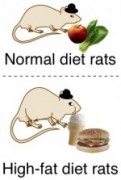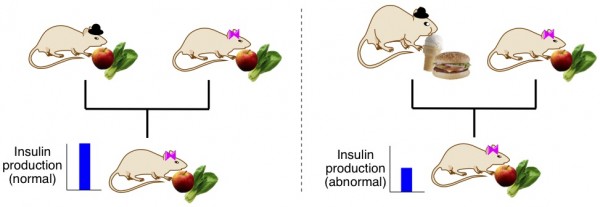 A recent study published in Nature reveals that a person’s risk of developing diabetes could be strongly influenced by their father’s bad eating habits back before he became a dad.
A recent study published in Nature reveals that a person’s risk of developing diabetes could be strongly influenced by their father’s bad eating habits back before he became a dad.
 Normally, we think of two major factors that contribute to a person’s likelihood of developing diabetes. One factor is genetics, and the other is lifestyle choices. For example, someone who lives a healthy lifestyle might still develop diabetes if he inherited a genetic predisposition to this condition from his parents. Conversely, a person who doesn’t exercise and eats a lot of junk food is at risk of becoming obese and/or diabetic even if his parents gave him great genes.
Normally, we think of two major factors that contribute to a person’s likelihood of developing diabetes. One factor is genetics, and the other is lifestyle choices. For example, someone who lives a healthy lifestyle might still develop diabetes if he inherited a genetic predisposition to this condition from his parents. Conversely, a person who doesn’t exercise and eats a lot of junk food is at risk of becoming obese and/or diabetic even if his parents gave him great genes.
There’s another possible risk factor that makes some intuitive sense. If a mom is obese and eats junky food while pregnant, it makes sense that the child could have some weight and metabolism issues, even if there’s no genetic predisposition to these things. After all, the kid spent nine months essentially eating whatever his mom ate. But what about if a dad is obese and eats a bad diet before the child is conceived? It’s kind of surprising, but it turns out that this too can have an effect on the child’s metabolism.
Ng and coworkers were curious what effect a father’s diet choices could have on his offspring’s metabolism, since similarities have been observed in humans between father and daughter obesity and insulin resistance. They performed a study on rats in which they raised fathers-to-be with either a high fat diet or just normal balanced rat food.
 Unsurprisingly, the male rats that ate a high fat diet were heaviermore body fat, lower muscle to weight ratio, more insulin resistant, and less tolerant of glucose (these latter two characteristics mean that they had diabetes or something similar in rat terms, or were well on their way to such a condition). It is important to note that all the rats had very similar genes – neither the rats eating fatty food or the rats eating healthy food had any particular genetic predisposition to obesity or diabetes.
Unsurprisingly, the male rats that ate a high fat diet were heaviermore body fat, lower muscle to weight ratio, more insulin resistant, and less tolerant of glucose (these latter two characteristics mean that they had diabetes or something similar in rat terms, or were well on their way to such a condition). It is important to note that all the rats had very similar genes – neither the rats eating fatty food or the rats eating healthy food had any particular genetic predisposition to obesity or diabetes.
The fat male rats and the average male rats were mated with female rats who ate normal rat food. After the babies were weaned, they were fed normal (not fatty) rat food. The offspring with fat dads didn’t seem to be any fatter than the ones with average-sized dads (in fact, the female ones were a little underweight when they were born). However, the femaleMale offspring weren't studied extensively because preliminary results indicated no metabolic impairment. offspring of the dads who had eaten fatty food were less tolerant of glucose and produced less insulin. By the time these girls were 12 weeks oldkind of like a rat teenager, they could only produce half as much insulin after eating sugar as normal rats. The researchers found that these female rats with junk food-eating dads had significantly fewer than normal of the pancreatic cells responsible for making insulin.
 The mechanism by which the father rats’ diet affected their daughters’ metabolism is pretty fuzzy, but may be attributable to epigenetic DNA modification. An epigenetic modification is one that doesn’t actually change the genetic code; rather it’s like marking certain genes with a Post-It note that tells the body to upregulatetranslate the gene into proteins, etc. at a more frequent rate than normal or downregulatetry to ignore the gene, and translate it less frequently than normal that gene. Epigenetic modifications of DNA can be induced by many factors. The authors of the study speculate that a father’s high-fat diet, or his resulting health conditions, can induce permanent epigenetic modifications to the DNA in sperm. As a consequence, these epigenetic modifications could be passed on to children.
The mechanism by which the father rats’ diet affected their daughters’ metabolism is pretty fuzzy, but may be attributable to epigenetic DNA modification. An epigenetic modification is one that doesn’t actually change the genetic code; rather it’s like marking certain genes with a Post-It note that tells the body to upregulatetranslate the gene into proteins, etc. at a more frequent rate than normal or downregulatetry to ignore the gene, and translate it less frequently than normal that gene. Epigenetic modifications of DNA can be induced by many factors. The authors of the study speculate that a father’s high-fat diet, or his resulting health conditions, can induce permanent epigenetic modifications to the DNA in sperm. As a consequence, these epigenetic modifications could be passed on to children.


